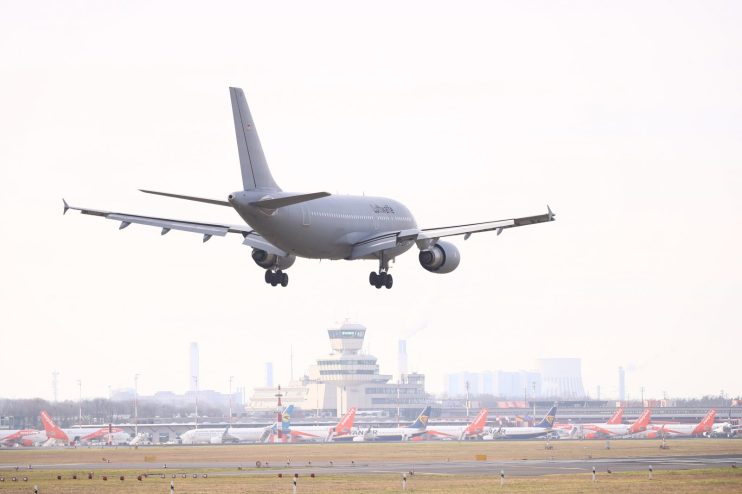Ryanair: UK passengers face ‘unfair burden’ from carbon clampdown

Passengers risk bearing the brunt of higher prices amid the government’s “unfair” clampdown on carbon emissions, Ryanair, one of the UK’s leading airline operators, has warned.
The typically combative budget airline giant told City A.M. that newly introduced costs for carriers represent “an unfair burden for UK consumers who have no alternative means of connectivity.”
“While Ryanair supports the goal of net zero emissions, achieving this poses unique challenges for the UK whose citizens and economy are dependent on air connectivity with the EU,” a spokesperson said.
Ryanair’s stinging criticism follows the government’s decision to cut carbon allowances on Thursday, which has piled further pressure on aviation to go green.
Carbon allowances are effectively permission slips from the government for emissions, with energy intensive sectors such as aviation, manufacturing and power required to pay for every unit of carbon they emit.
Last week, the government unveiled a 12.4 per cent cut in available allowances next year: dropping from 79m to 69m — their lowest-ever level.
It is now targeting a 45 per cent reduction by 2027 as part of its Emissions Trading Scheme (ETS), and an over 80 per cent decline by the end of the decade.
Ryanair argued that short-haul passengers were paying an “unfair burden” for decarbonising aviation, as long-haul airlines are currently exempt from the scheme.
Airlines UK, the trade body representing the country’s carriers, estimated that carriers would be forced to cough up an additional £4bn into the UK ETS by the end of the decade.
“It is vital for the UK’s competitiveness as a global aviation hub that this additional burden is balanced by steps that drive net zero solutions,” it said, giving the example of incentivising home production of sustainable aviation fuels (SAF), as is done in rival markets such as the EU and US.
Karen Dee, chief executive of industry trade body the Airport Operators Association, fears the government had a difficult balancing act — between reaching the country’s climate goals and not undermining investor confidence in the UK.
She argued the sector was heavily investing in greener solutions such as cleaner planes, sustainable aviation fuel and renewable electricity for operations.
“We must not make the UK an uncompetitive place to invest and do business whilst we do this,” Dee said.
“We must not make the UK an uncompetitive place to invest and do business whilst we do this”
Karen Dee, Chief Executive of the Airport Operators Association
She called for the government to “reinvest the funds raised from aviation back into the sector.”
“That way we work to transform aviation, not just reduce people’s access to it.”
Dee’s comments were echoed by Ryanair, who said the government must reinvest funds from ETS to “reduce the financial burden on airline passengers,” which often comes in the form of ticket fare hikes.
Adam Bell, ex-head of energy at BEIS and head of policy at Stonehaven told City A.M. that while this would not have been a surprise to the industry, it remains to be seen how these “new prices will bite.”
He said: “Whether carbon costs drive additional decarbonisation – or just reduce flying – is the critical question.”
The government hopes to soften the challenge industries face by allowing unused allowances between 2021 and 2023 to be used in auctions between 2024 and 2027.
A Department for Energy Security and Net Zero spokesperson said: “The UK ETS is helping us meet our ambitious climate commitments, cutting emissions by over 48 per cent since 1990, faster than any other G7 country. We are phasing out aviation free allocations by 2026, based on independent research suggesting there is a minimal risk of emissions moving from one country to another as most flights are return journeys.
“We recognise the steps the aviation industry is taking to help reach global net zero commitments and the majority of international flights departing the UK are covered by an international carbon offsetting scheme to tackle emissions.”